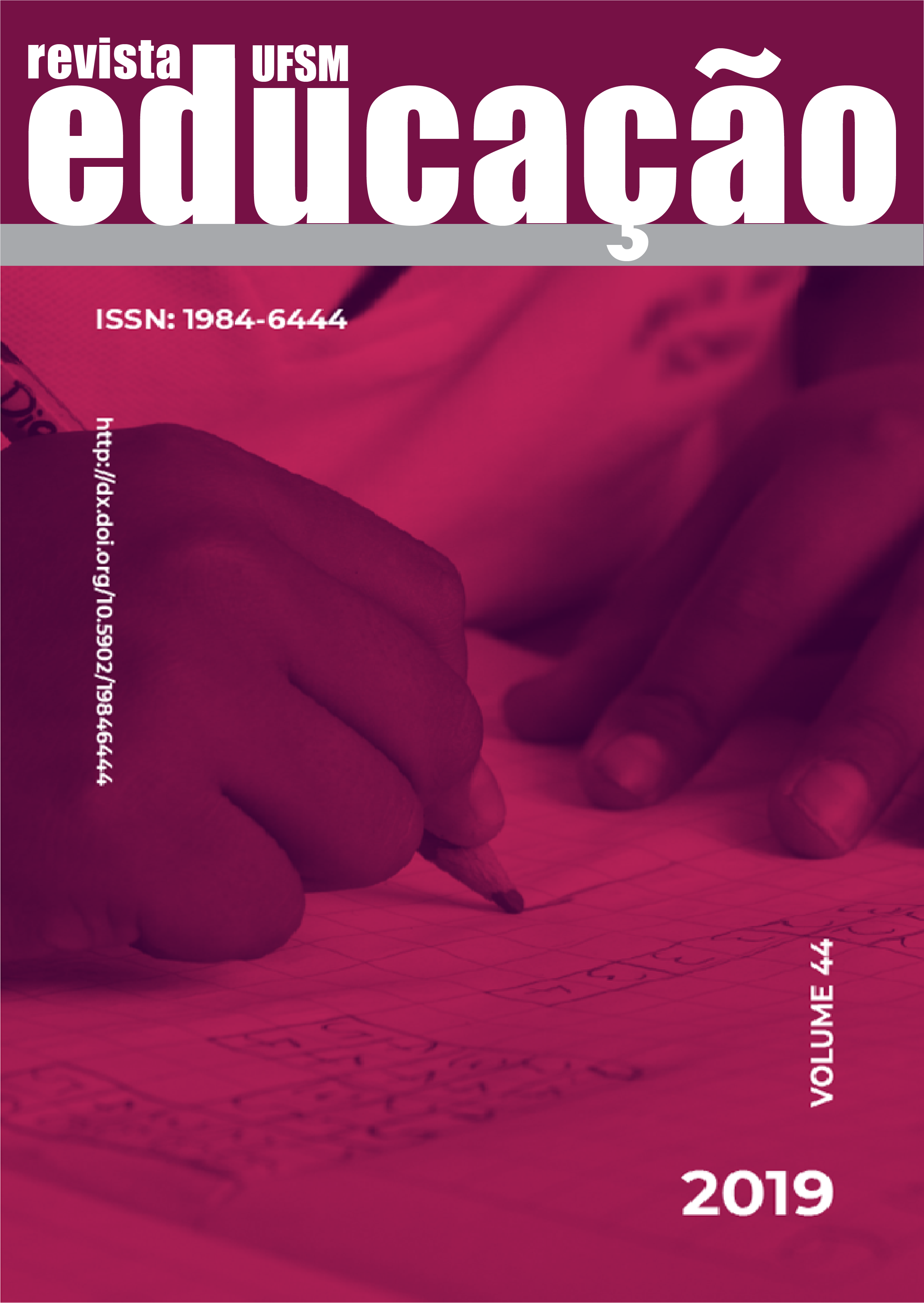Education and the self-experience in the stories of a narrator alongside Rio Doce
DOI:
https://doi.org/10.5902/1984644435418Keywords:
Education, Narrator, Experience.Abstract
It aims to understand the educational practices performed through the propagation of oral narratives of traditional narrators and the relationships between traditional narratives, self-experiences and education, reflecting on the entanglements between oral narratives and the constitution of the subjects. To do so, it uses the concepts of narrator and experience of Benjamin (1979) and of pedagogic device, experience and self-awareness of Larrosa (1994, 2004). With a qualitative approach, according to the methodological procedures, a case study that takes as a corpus the narratives, collected by recorded interview from Geni de Oliveira Ramos, a traditional narrator from the village of Povoação (Linhares-ES), located on the north bank of the Rio Doce mouth. From the transcription of the interview (DELGADO, 2006; MARCUSCHI, 2007), the data analyses points out eventual relationships of the collected stories with the Brazilian myths (CASCUDO, 1983; 1998). This study analyzes the narratives in the light of the theoretical reference, highlighting sections directly related to the elements of tradition and to the self-experience within the scope of the institution of pedagogic devices and educational practices in the time and space of the narration. Finally, it highlights the relevance of the research in the record of the community’s memory for its process of re-existence in face of the current situation of the Rio Doce, pointing to possible actions of transmission of self-experience from Dona Geni’s narratives to the new generations.
References
BENJAMIN, Walter. O Narrador. In: Textos escolhidos. Tradução de Modesto Carone. 2.ed. São Paulo: Abril Cultural, 1979, p. 57-74.
BENJAMIN, Walter. Sobre o conceito da história. In: Magia e técnica, arte e política: ensaios sobre literatura e história da cultura. Tradução de Sérgio Paulo Rouanet. 3. ed. São Paulo: Brasiliense, 2012. p. 241-252.
CASCUDO, Luís da Câmara. Geografia dos mitos brasileiros. Belo Horizonte: Itatiaia; São Paulo: EdUSP, 1983.
CASCUDO, Luís da Câmara. Dicionário do folclore brasileiro. 3. ed. Rio de Janeiro: Ediouro, 1998.
DELGADO, Lucília de Almeida Neves. História Oral: memória, tempo, identidades. Belo Horizonte: Autêntica, 2006.
GIRARDELLO, Gilka. Uma clareira no bosque: Contar histórias na escola. Campinas: Papirus, 2014.
LARROSA, Jorge. Tecnologias do eu e educação. In: Silva, Tomaz Tadeu (Org.). O sujeito da educação. Tradução de Tomaz Tadeu da Silva. Petrópolis: Vozes, 1994, p.35-86.
LARROSA, Jorge. Linguagem e educação depois de Babel. Tradução: Cynthia Farina. Belo Horizonte: Autêntica, 2004.
MARCUSCHI, Luiz Antônio. Da fala para a escrita: atividades de retextualização. 8. ed. São Paulo: Cortez, 2007.
MELLO, Thiago. Antemanhã. Correio da Manhã: 1º Caderno. Rio de Janeiro, n. 19436, p. 9, 4 ago. 1956.
SILVEIRA, Denise Tolfo; CÓRDOVA, Fernanda Peixoto. A pesquisa científica. In: GERHARDT, Tatiana Engel; SILVEIRA, Denise Tolfo (Orgs.). Métodos de pesquisa. Porto Alegre: Editora da UFRGS, 2009, p. 31-42.
Published
How to Cite
Issue
Section
License
Declaration of originality
We declare that all articles present in the journal Educação (UFSM) are originals and were not submitted for publishing on any other publication, as a whole or a fraction. We also declare that, after being published by Educação (UFSM), a paper will not be submitted to another journal within two years. After this time, our journal transfers the publishing rights to the authors, with a permit granted by the Editorial Council.
We also acknowledge that the originals’ submission to Educação (UFSM) implies on a transference of copyright for physical and digital publishing to the journal. In case of noncompliance, the violator will receive sanctions and penalties predicted by the Brazilian Copyright Protection Law (n. 9610, dated 19/02/98).
Attribution 4.0 International (CC BY 4.0)
This license lets others remix, transform, and build upon the material for any purpose, even commercially, and copy and redistribute the material in any medium or format.

This work is licensed under a Creative Commons Attribution 4.0 International (CC BY 4.0)






